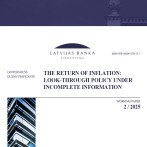The effect of food prices on price rises growing
The annual average inflation, after which the Maastricht criterion is calculated, in Latvia remained negative in September - i.e. deflation was at -1.8%, and deflation is likewise expected in the year as a whole.
Calculating the price changes year-on-year, inflation of 0.4% was registered after a year's pause. Over the month a 0.4% price rise was also registered while for several groups of goods and services prices continued to drop - a total of 32% of the basket of commodities.
The annual price rise was primarily on account of the rise in energy prices. The prices of energy resources pushed the annual inflation up 1.3 percentage points, and, subtracting the effect of energy resources, the consumer price rate was 1.0% lower than a year ago. 61.6% of the basket of commodities prices was still under the previous year's level, over the year, prices have dropped substantially for clothing and footwear, the majority of services as well as household-related goods.
The monthly rise in prices was primarily accounted for by a seasonal rise in the prices of clothing and footwear. Yet it was also affected by the anxiety over the prices of buckwheat that followed the news about the drop in grain production in Russia and the global rise in grain prices. This has resulted in a 5.1% increase in the prices of grain products pushing the overall inflation up by approximately 0.1 percentage point. The price rises in the retail sector however were primarily caused by a sudden, short-lived rise in demand and not so much by the global price rises: buckwheat prices have already gone down in a number of places. As the supply resumes, the prices should therefore return to the previous level in short order. With the trade price of natural gas decreasing in September by 3.9%, the heating tariffs have dropped and the cost of many services was likewise continuing to go down.
In its September report on the developments in the foodstuffs market, the global Food and Agriculture Organization (FAO) informs of a continued rise in food prices, particularly those of wheat, while they have still been 25% lower than their peak level in 2008. The price rise is primarily related to the uncertainty regarding the total volume of grain produced. The FAO suggests however that the global grain stocks are still substantial and therefore, albeit the volume of grain harvest is predicted 4.8% lower than a year ago, the supply is still adequate and the price rises should abate in the near future. Thus there is also no reason to expect a rapid and sustained rise in food prices in Latvia.
A rapid rise in inflation in the near future will be limited by the persisting low demand. The slow recovery of domestic demand will limit the influence of global processes on the rise of food prices. Moreover, the costs relating to the heating season and the rising food prices, which translate into priority expenditure, will have a dampening effect on the population's demand for other goods, thus substantially decreasing the pressure of inflation.
Textual error
«… …»






